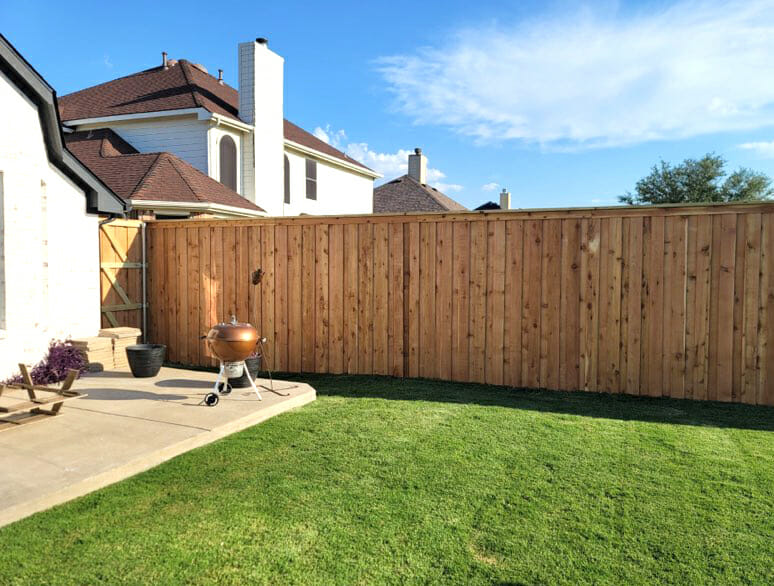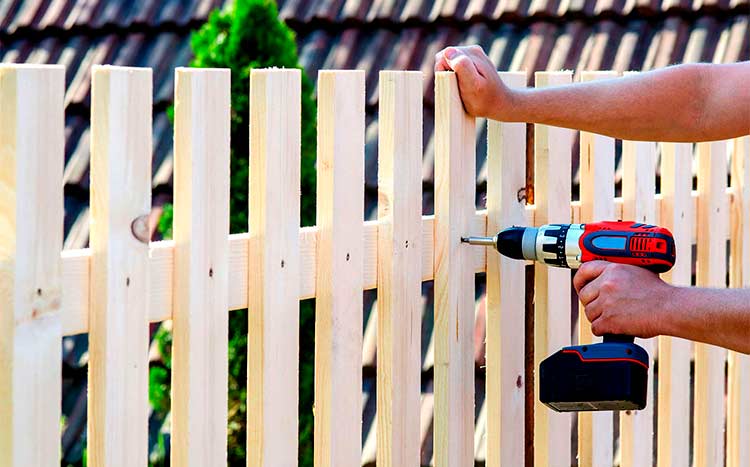Comprehending the fence laws in Michigan can aid in preventing conflicts that arise from fences marking property boundaries. It’s common for neighbors to have disputes regarding the objective, ownership, and duties associated with a mutual fence.
What we cover
ToggleDo I Need A Permit to Build A Fence in Michigan?
You may be required to apply for a fence permit depending on where you live or where your property is located in Michigan. Cities, like Lansing, do not require a permit for fence construction but have comprehensive guidelines in their zoning ordinance that you must follow. Others like Flint require a certificate of zoning compliance.
Some of the major cities in Michigan where you are required to obtain a permit before you build a fence include:
- Detroit– Building permits required for fences above 7 Feet in height- Zoning requirements may also apply- Refer to local building ordinances
- Grand Rapids– Fence permit required (application can be done through the city’s online portal)
- Ann Arbor– Fence permit required (application form can be downloaded from the city’s portal)
- City of Flint– You need to apply for a certificate of zoning compliance in Flint to build a fence
- Traverse City- Fences 7 Feet in height or taller require a land use and building permit in Traverse city.
You can check with your local building codes department or city hall whether you require a permit before you erect your fence. Local fence contractors can also help with obtaining permits and complying with local fence ordinances. While you may not require a permit to build your fence in some places, you must adhere to local ordinances if they exist.

Can I Replace an Existing Fence Without A Permit?
You may be required to apply for a new building permit if you decide to replace an existing fence. Fence permits are issued to ensure compliance with local building codes or requirements. This means that a new fence must be inspected by the relevant body in your area for approval.
However, you might be exempted in some places if the new fence has similar specifications in terms of height and materials used to the old fence. Go over the plan with your fence contractor before you start building to understand what is required and if you need a new permit. Local building codes cover small details such as fence opacity and offset distances that you might miss when building your new fence.
Who pays for the fence between neighbors?
Property owners who build a fence on the boundary shall bear the cost of constructing and maintaining the fence according to Michigan state’s Act 34 of 1978 section 43.53. Only when the adjoining property owner starts or decides to utilize the fence will they be required to compensate the fence owner a proportionate amount of the cost. Additional county, city, or municipal fence ordinances may apply where they exist.
How Tall Can A Privacy Fence Be in Michigan?
The average maximum fence height in the state of Michigan is 6 Feet in front yards and 7 Feet in other areas. Fence height requirements are contained in the local fence or building codes where they exist.
The table below shows maximum allowable fence heights in residential areas across the state. Be sure to check current local ordinances in your area before you design or build your fence.
| City, Town, or County in Michigan | Maximum Fence height (residential districts) |
|---|---|
| Detroit | 3 Feet (Fronts yards- for corner lots on the side of public right of way), 6 Feet (front yards), 8 Feet (Rear property line). |
| City of Grand Rapids | 6 Feet Uniform |
| Ann Arbor | 4 Feet (Front yards), 6 Feet (side yards), 8 Feet (Rear yards)-Additional requirements for properties in historic districts. |
| Traverse City | No fence ordinance but fences taller than 7 feet require a land use and building permit |
| Flint, MI | 5 to 6 Feet depending on the zoning district and location of the property and fence. |
| Dearborn | 5 Feet uniform – excluding decorative lattice |
| Kalamazoo | Kalamazoo-4 feet in front setbacks and 7 feet in side and rear yards |
| Saginaw | 4 feet in front and side yards |
| Pentwater, MI | 3 Feet in front yards and 6 Feet in other areas |
Note that fence heights are measured from ground level on the higher side of the fence or wall including additional items such as lattice and electric wire where allowed.
How High Can You Build A Fence in Your Backyard?
Rear yard fences are usually allowed to be taller than front fences based on various fence ordinances across Michigan. A rear yard fence not exceeding 7 Feet In height is allowed in most places although additional requirements for corner lots where the backyard is adjacent to a public right of way lot may apply. Check the relevant local fence ordinance for backyard fence restrictions where they exist.
Who Owns the Fence on Property Lines In MI?
The property owner who builds a property line fence owns it according to Michigan boundary fence law Act 34 of 1978 section 43.53. They can maintain sole ownership of the boundary fence until such a time that the adjoining landowner starts using it then they can seek compensation from them. The amount to be paid will be agreed upon between the two landowners.
In most cases, however, landowners sharing a boundary can sign an agreement specifying how they will share the costs of constructing and maintaining the fence. Boundary line agreements are recognized by law across the country and can help prevent fence usage disputes.
How Do You Know Where the Property Boundary Is?
Property lines, boundary lines, or lot lines can be identified by a licensed land surveyor in the state of Michigan. Surveyors use existing plat maps and onsite measurements to locate the property boundary and place permanent markers. You can also identify your property line using a council-issued metal detector in some places if available.
Can My Neighbor Build A Fence on The Property Line?
There is no law at the state level that prevents your neighbor from erecting a fence on the property line. According to Michigan fence law, property owners can erect fences on property lines and maintain ownership of the said fences until other parties start using the fence. However, local building codes may contain additional offset requirements that prevent your neighbor from placing their fence on the boundary.
Can I Put Up A Fence on My Side of The Property Line?
You are allowed to build a fence on your side of the property line at your own cost according to Michigan fence law. You will have exclusive rights to the fence until your neighbor starts using it and you agree on how they will compensate you for construction and maintenance costs. You can also avoid sharing the fence with your neighbor by placing it away from the boundary line.

What Is A Spite Fence?
A “spite fence” is one built with malicious intent and solely to obstruct a neighbor’s light, air, or view, and serves no useful purpose or advantage to the landowner. A fence, which, through lack of maintenance or type of construction or otherwise, imperils life or property may also be considered a spite fence. Spite fences are illegal and can be pulled down if a complaint is made by the affected landowners.
Michigan Boundary Fence Laws at A Glance
| Statues | Boundary Fence Rules | Spite Fence Rules |
|---|---|---|
| Boundary fences: Michigan compiled laws section 43.53 | The owner of real property who builds a fence must pay for construction; If a neighbor begins using the fence to restrain animals, the neighbor shall compensate the property owner for his/her proportionate share of the fence; Each township appoints a “fence viewer; who is responsible for adjudicating disputes among neighbors regarding property lines, mutual costs for maintaining fences, and damages to fences; | A “spite fence” is one built with malicious intent and solely to obstruct a neighbor’s light, air, or view, and serves no useful purpose or advantage to the landowner; A fence that is found to be a spite fence can be determined to be a nuisance that unreasonably interferes with the neighbor’s use and enjoyment of his property. |
FAQ's
Who Owns the Fence Between Neighbors?
The property owner who constructs a fence owns it according to Michigan fence law. Neighbors can request joint ownership if they need to use the fence and compensate the owner at a later date.
What If A New Fence Is Blocking My View?
A fence that is blocking your view can be deemed a spite fence or a nuisance if adequate proof is given in a suit to that effect. Fence guidelines across the state of Michigan generally prohibit tall opaque fences on front yards and sides facing public utilities or lots. Fence viewers selected from the city or township can resolve disputes arising from fences in the state of Michigan.
Can I Paint My Side of The Fence?
You are not allowed to paint your neighbor’s fence unless you get permission from them or have a property line agreement that allows you to maintain your side of the fence.
Can I Build A Fence Next to My Neighbor’s Fence?
Yes, this is the alternative recognized under Michigan law, to claim exclusive rights to your fence even if it is separating your lot from the neighbor’s.
Can My Neighbor Remove the Fence Between Our Properties?
Your neighbor is not allowed under Michigan law to demolish a fence on the property line if you constructed it.
Can My Neighbor Stop Me from Putting Up A Fence?
Your neighbor does not have a right to stop you from putting up a fence on your lot or directly on the boundary line. However, it is best if you sign a boundary line agreement with your neighbor before you utilize property lines to avoid disputes.













